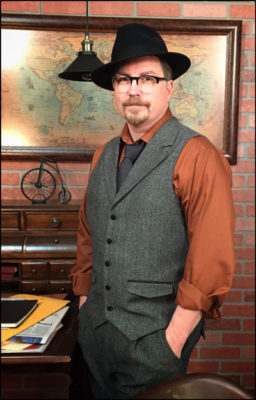The Price Of Otherness
Operation Grendel is a standalone military science fiction novel told from the perspective of an embedded reporter. The story deals with propaganda and psychological warfare in an era of embedded artificial intelligence. What will it be like when every thought, feeling and impulse is subject to the oversight of a quantum overlord?
This is the idea that prompted my fictional exploration of warfare between civilizations fighting over the importance of human autonomy. What fascinates me is potential for reality to become the stuff of nightmares.
Speculative fiction is based on otherness—the difference between the world of reality and the world of a story.
In science fiction this usually means some change in technology, or society creates a world different than our own: aliens invade earth or techies invent faster-than-light travel or some pudding-headed scientist brings back dinosaurs in a theme park.
In fantasy the otherness of Narnia or Middle Earth contains a supernatural element. Magic is real, or monsters wreak vengeance against an arrogant culture, or talking animals struggle against some great evil.
Naturally any point of otherness will produce a ripple effect of consequences. The existence of Count Dracula means there are other vampires, as well as vampire hunters. Still, the cause of those ripples—that Dracula exists—is a single cast stone.
Whatever that single point of otherness is, it has to be meaningful to us in our world. Which means the otherness has to come at a price.
The reason is simple: the technological and human advancements of the past have always cost more than we expected, so we expect such changes to be expensive.

Photo by Burak K from Pexels
You might say the price of cars is exhaust, and paved roads, and accidents, and increased taxes, and disconnection from nature. The list could go on.
The point isn’t that technology is bad, but that the positive aspects of technology are always accompanied by something negative. Unintended consequences are part of reality.
The same thing is true in fantasy. Supernatural laws and beings and events must also come at a price. In fact, it’s probably even more important in a fantasy novel.
Why? Because readers typically don’t encounter the supernatural in the real world the same way we encounter things like technology. We take electricity for granted. We don’t take miracles for granted. We don’t expect angelic visitations in the same way we expect the radio to work when we switch it on.
So when you write a novel in which angelic visitations happen, your reader has to work harder to suspend her disbelief. Most readers can’t relate to the miraculous being possible, much less normal. So the fantasy writer has to purchase the reader’s participation. And he does it by making the magic or the miraculous expensive.
 Because I run a novel writing contest for young writers, I read a lot of stories by teens, and one kind of story that shows up frequently is shape-shifter stories in which the hero can transform himself into a bear, a lion, a wolf or whatever. This is a legitimate story device in fantasy, but traditionally these books have been about how bad it is to be a shape-shifter, not how good it is to be a shape-shifter.
Because I run a novel writing contest for young writers, I read a lot of stories by teens, and one kind of story that shows up frequently is shape-shifter stories in which the hero can transform himself into a bear, a lion, a wolf or whatever. This is a legitimate story device in fantasy, but traditionally these books have been about how bad it is to be a shape-shifter, not how good it is to be a shape-shifter.
It’s relatively recently that western fantasy writers have embraced heroes who shape-shift. In my opinion this is because our culture is moving away from a Christian understanding of the supernatural. We used to think that supernatural powers which didn’t reinforce virtues were destructive. They were bad. So werewolves and vampires were symbolic of man’s corrupt nature. The message used to be a warning: you have to be careful or the vampire of your corrupt humanity will take over. Or, don’t let your wolfish nature control your destiny.
But more important from a writing standpoint is the weakness of this story device. If you’re going to have a good hero who can shape-shift into, for instance, a grizzly bear, then you inescapably create for yourself a huge problem. Whatever difficulty your hero runs into, he can always get out of it by changing himself into a bear. And your reader is going to say under her breath, “Well, yeah, of course he can out of that situation. All he has to do is change into a grizzly and all his problems go away.”
When it’s attached to an evil character, a supernatural power moves the story forward. It creates an internal struggle between the character’s desire to do good and his desire to do evil, with the evil side being really strong.
But when it’s attached to a good character, that power the hero has—to turn himself into a bear, or to fly, or to shoot fireballs from his fingertips—removes the potential for real danger (for conflict). And that makes the story uninteresting. It doesn’t matter what the power is. The same thing will be true for spell-casting wizards, or heroic vampires, or pretty much any hero with a powerful supernatural gift.
The solution to this problem is to make the gift come at a price. The bigger the power, the bigger the price should be. In fact, the price should always be higher than the value of the power. It should always seem a little too high. That is, it should be high enough that the reader wonders if it’s worth it.
This is important. If the reader doesn’t wonder to herself, “Wow, if it were me, would I pay that price to change into a grizzly, or would I let myself be mauled by the wolf pack?” If she isn’t asking that question on some level, then the price your hero has to pay for his power isn’t big enough.
In Lord of the Rings, Frodo has the power to make himself invisible just by slipping on the One Ring. And yet, the price he pays is extraordinary, because although the ring makes him invisible to everyone else, it makes him visible to Sauron and the ring wraiths. So whenever he starts to put it on, no matter how bad the situation is, we in the audience feel like shouting, “Don’t do it!”
That’s the price of magic.
When you make it cost so much that the reader doesn’t want you to use it, you have the essence of speculative fiction.
The essence of Operation Grendel is that we’ve only begun to imagine the benefits of quantum artificial intelligence. I suspect it will come with the promise of making every human longing possible.
But in the end, the price will be higher than we imagine.
 – – – – –
– – – – –
AUTHOR BIO
Daniel Schwabauer is an award-winning author and teacher. He is the creator of The One Year Adventure Novel, Cover Story, Byline and the young adult novels in The Legends of Tira-Nor series.
His professional work includes stage plays, radio scripts, short stories, newspaper columns, comic books and scripting for the PBS animated series Auto-B-Good. His young adult novels, Runt the Brave and Runt the Hunted, have received numerous awards, including the 2005 Ben Franklin Award and the 2008 Eric Hoffer Award.
He graduated with honors from Kansas University’s Masters program in Creative Writing in 1995 under the guidance of science fiction writer James Gunn. You may learn more about Dan and his work at his website.
Featured photo by Jonas Ferlin from Pexels











































Ha, your complaint about the hero turning into a bear to solve all the problems made me think of all the ways that Star Trek in its various forms had to nullify the transporters or prove that Worf couldn’t just punch the problem away (https://tvtropes.org/pmwiki/pmwiki.php/Main/TheWorfEffect).
Good point! Come to think of it, they didn’t really explore the price of transporters in the original series.
I like this.
There always seems to be those movies and such where the heroes can do things so amazing that the abilities have to be taken away or ignored so things don’t become too easy and convenient for them. The conflict between pros and cons of using these abilities could really help out in these situations. Like with Daredevil. He has these abilities but he’s also blind, oversensitive to sound, and Catholic, which presents difficulties that allow a conflict between his powers and ability to help people, and the weaknesses that come with it as well as the moral issues. It comes at a price. I think it’s good to have the weakness built in to the strength so it’s kind of like foreshadowing, in a way — meaning that the problems are there in the beginning and don’t have to be brought in later, and we can feel the problem looming and watch/read on in the hope that good will win out in the end. Like, imagine if instead of the ring causing Sauron and the wraiths to see Frodo and for that ring also to tempt with its power, especially Smeagol, that at some points Frodo just loses the ring or forgets its there so bad things can happen and the story can progress. That would take away a massive chunk of the theme and wouldn’t be so compelling.
Anyway…
Thanks for the article.